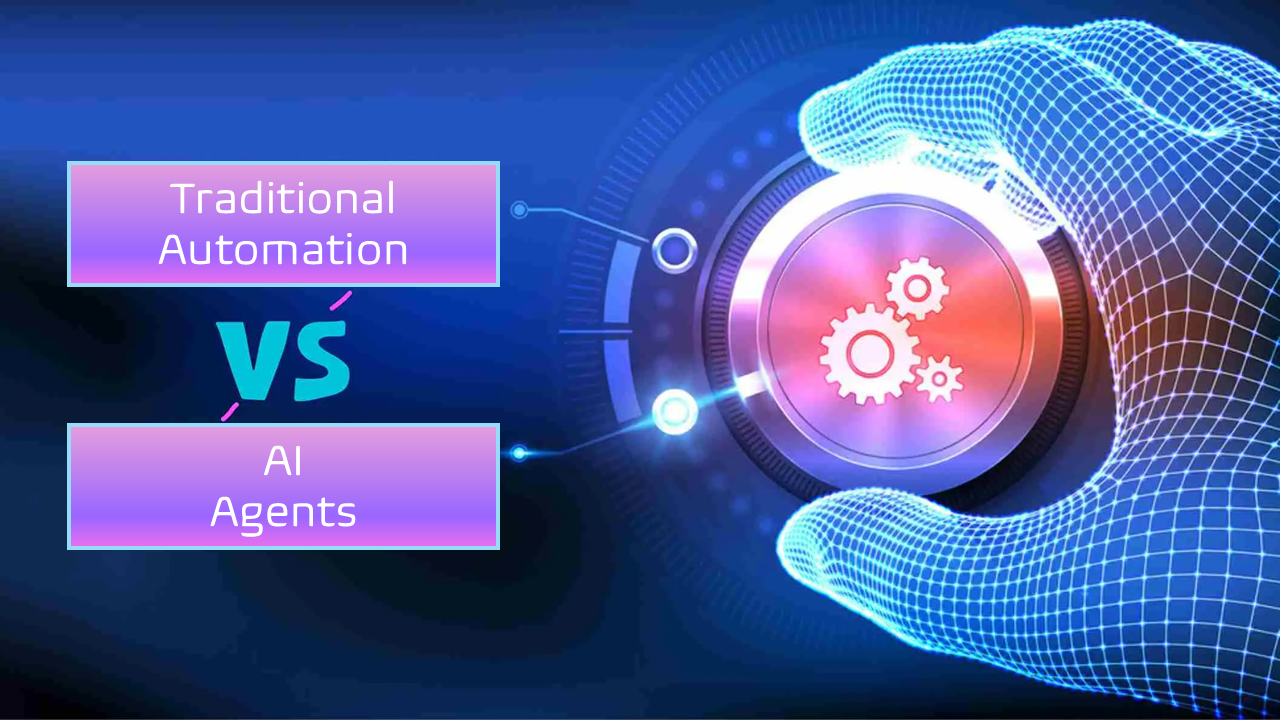AI Agents vs. Traditional Automation: Which Is Right for Your Business?

Businesses today face a critical question: should they stick with traditional automation systems or explore the power of AI agents? Both approaches aim to improve efficiency and reduce human workload, but the way they function and the results they deliver are vastly different. Understanding the differences can help organizations choose the right solution for their unique challenges.
What Is Traditional Automation?
Traditional automation refers to rule-based systems designed to perform repetitive tasks with minimal human intervention. These tools follow predefined instructions and workflows. For example, a company might use robotic process automation (RPA) to manage invoices, process payroll, or handle data entry.
The strength of traditional automation lies in its reliability. Once a process is mapped, the system executes it consistently without deviation. However, these solutions are rigid. If a situation falls outside the programmed rules, the automation fails and requires human oversight.
What Makes AI Agents Different?
AI agents go far beyond simple rule-following. Built on advanced machine learning and natural language processing, they can learn, adapt, and make decisions based on changing circumstances. Instead of just following instructions, they analyze data, understand context, and even improve performance over time.
For example, a customer service AI agent doesn’t just send out prewritten replies. It can understand customer intent, respond conversationally, and even escalate complex issues when necessary. Similarly, AI agents in supply chain management can predict delays, recommend alternatives, and adjust logistics strategies in real time.
Key Differences Between AI Agents and Traditional Automation
The fundamental difference lies in flexibility. Traditional automation handles repetitive, predictable tasks well, but it struggles with unexpected variations. AI agents, on the other hand, thrive in dynamic environments.
Traditional automation is best suited for tasks like data migration, compliance reporting, and financial reconciliations. Where rules are clear and consistency is critical. AI agents shine when tasks require context, pattern recognition, or real-time decision-making, such as fraud detection, customer engagement, or personalized marketing.
Which One Should Businesses Choose?
The right choice depends on business goals and the complexity of operations. For organizations looking to streamline repetitive tasks with minimal variation, traditional automation remains cost-effective and efficient. However, businesses aiming for scalability, customer personalization, and adaptive intelligence should lean toward AI agents.
In reality, many companies find success in a hybrid approach. Using traditional automation for structured, rule-based processes while deploying AI agents for dynamic, data-driven operations creates a balance between reliability and adaptability.
Companies that partner with an AI development company can design tailored solutions to integrate both automation styles into their workflow. With the right strategy, businesses can maximize efficiency while staying flexible in a competitive landscape.
The Role of AI Development Services in the USA
As businesses expand, demand for AI development services in USA has grown rapidly. Organizations are no longer satisfied with static automation; they want systems that can think, adapt, and evolve. AI agents are enabling companies in industries like healthcare, finance, logistics, and retail to make smarter decisions and deliver personalized experiences.
The good news is that businesses don’t have to choose blindly. Expert providers guide companies through evaluating current processes, identifying opportunities for automation, and building custom AI solutions. For a detailed breakdown of how AI agents compare to traditional automation in practical business settings, you can explore this guide: AI Agents vs. Traditional Automation.
How Do AI Agents Impact ROI?
One of the biggest reasons businesses consider AI agents over traditional automation is the potential for higher returns. Traditional automation typically saves costs by reducing manual labor. AI agents, however, not only cut costs but also create new opportunities.
By analyzing customer behavior, optimizing operations, and predicting market trends, AI agents can generate value beyond process efficiency. Companies adopting AI agents often see improved customer satisfaction, better employee productivity, and new revenue channels.
Are AI Agents Always the Better Choice?
Not necessarily. While AI agents bring adaptability and intelligence, they require more investment upfront. Training data, integration with existing systems, and ongoing refinement can be resource-intensive. Smaller businesses with limited budgets might prefer starting with traditional automation and scaling into AI gradually.
That said, even small organizations can explore modular AI solutions today. Many AI development companies offer scalable packages that allow businesses to start small and expand as they grow.
Frequently Asked Questions
1. Can traditional automation and AI agents work together?
Yes. Many businesses integrate both. Traditional automation handles repetitive tasks, while AI agents manage complex, adaptive processes. This hybrid model maximizes efficiency and intelligence.
2. Is investing in AI agents too expensive for small businesses?
While the initial investment can be higher than traditional automation, many providers now offer scalable and affordable AI solutions. Small businesses can begin with specific use cases and expand as they see results.
3. Do AI agents replace human workers?
Not entirely. AI agents reduce repetitive workloads, allowing employees to focus on strategic, creative, and relationship-driven tasks. Instead of replacement, the technology usually enhances human roles.
4. How long does it take to implement AI agents?
Implementation timelines vary depending on the complexity of the project. Basic AI solutions may take a few weeks, while enterprise-level integrations can take several months. Working with an experienced AI development company helps speed up the process.
5. Which industries benefit most from AI agents?
AI agents are making an impact across industries. Finance uses them for fraud detection, retail for personalized shopping, healthcare for diagnostics, and logistics for predictive supply chain management.
Final Thoughts
The debate between AI agents and traditional automation isn’t about which is better overall—it’s about which is better for your business goals. Traditional automation delivers consistency, while AI agents bring adaptability and intelligence. By evaluating processes and partnering with experts, businesses can strike the right balance, future-proofing their operations and staying ahead of the competition.



